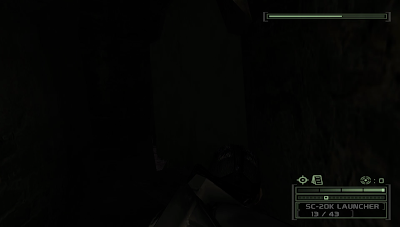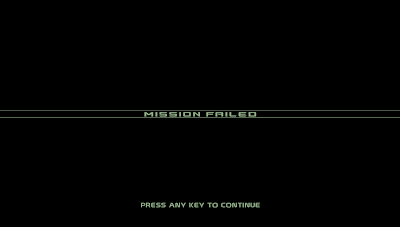You're not afraid of the dark, are you? In a world of Tom Clancy's making, you should be. They lurk in the darkness. They strike from the darkness. They embody the darkness. And no game renders darkness quite as well as Tom Clancy's Splinter Cell: Chaos Theory, the third in the stealth series.
Sam Fisher returns in all his gravelly-voiced glory to split jump up walls, dangle from pipes and interrogate soldiers before ghosting back into the shadows. The many, many shadows. May your brightness and contrast settings be set in your favour.
Frustrations
With a couple of different versions of Chaos Theory available to me, I chose to play this on the PC, and within seconds of the first cutscene beginning, I am lost.
You can drop players into the story without any setup and still have a good time but in a political espionage thriller, it does help to have just a little bit of back story for us simple folk to latch onto. I know I'm Sam Fisher, I know I'm part of a covert group that doesn't exist, and I know I solve problems, but there is absolutely no way I know what the hell is going on here, even with news anchors trying to set the scene.
News anchors and archival footage still isn't enough to give me a clue what's going on, beyond 'Crisis in Korea Strait'. The ISDF is asking for help, whoever they are. Was it their ship who we saw getting boarded? You look like a military-type; can't you just launch a mission yourself? How has this made the news?
Ok, here I can guess we've been flown somewhere close to the incident, but why us? What stake do we have in this? Why must the one and only Sam Fisher be here?
Five experts giving me some briefing blurb and still I'm none the wiser. We're rescuing a hostage, but we're not even on a boat. What was all that stuff about the boat? Was our target brought off the boat? Does the boat even have anything to do with this mission? Was it just a news story? I am so lost.
We then get the choice of loadout: quiet, loud, or a bit of both. I can only really choose the recommended gear, right? I mean, I don't even know what I'm heading into, and whether going loud is even an option.
Jesus, that's dark. We're playing Splinter Cell, alright. When you can work out what you're looking at, it's actually pretty nice. Definitely an improvement over the original Splinter Cell. It controls better too, but I can't put my finger on why. Maybe I've just played more games like it since having played the original. Maybe I've just forgotten the original.
I know I'm getting old and my eyes weren't what they used to be, but this game does feel like it's taking the piss when it comes to dark environments. I don't know why you'd ever want to shoot out a light when you desperately need it to see where you're going, but at least Sam can actually hit the damn lightbulb on the first attempt in this game.
As ever, you've got yourself some fancy night/thermal/something else goggles to help light up the level and give everything that sickly green glow. It's so Splinter Cell that we might as well give its name to the colour. Splinter Cell green.
Spot the enemy. Go on, I'll wait. He's in Splinter Cell green, behind the Splinter Cell green stalagmite, which is itself camouflaged against the Splinter Cell green cave wall. This part of the cavern is actually quite lit up, as the night vision gives away, and I was spotted by a couple of guards before I saw them.
Combat - for me - involves pressing the A button to bring up your weapon, switching into an over-the-shoulder view, then squeezing the trigger to fire a round or two. I have the difficulty on easy, so the guards stood there, waiting for it, but the fact that they didn't spot me until they were practically on top of me is something that the Splinter Cell series does well. If it's dark and quiet enough, you can get close enough to feel their breath - talk about tense stealth gameplay.
I was having none of that, though. Instead of daring guards to come closer, I was pausing every few feet to see which goggle could actually show me the level in a manner in which I could understand what I was looking at.
Now the word 'hostage' was mentioned a couple of times in the briefing, but Lambert wants me to scan some barcodes on some crates of weapons, which is a side objective that will have us investigate areas of the map that aren't necessarily on your route to the main objective. It's there to give players the chance to see multiple routes through each level. I was just happy to see a route, whether it had a side objective on it or not.
Fun Times
As the level went on, more and more Splinter Cell seeped into it, including interaction with the environment in different ways. As well as shooting out lights, you can switch them off at the wall, or otherwise cut the power. Instead of just opening a door, you can slip a camera under it, or push it slightly, or kick it in, all of which have their uses, depending on what is on the other side.
Sneaking up to a torture room, I learn that going loud isn't necessarily a problem. Perhaps not advised, but the entire level doesn't descend upon you if your gun starts shouting.
Wait, was this guy the hostage we were meant to rescue? I hope not. Lambert and Fisher comment on the scene, but I wasn't following what they said. I'm just exploring the level looking for boxes to scan because that's the only objective I can get my head around - and it's not even the main goal of this level.
Lockpicking and slicing through canvas tents are more skills we've mastered, and they're all used to tackle the level the way you want to tackle it. Not with an incredible amount of freedom, like a Hitman title, but more than you might imagine for a Splinter Cell game.
Further Frustrations
If you could see a damn thing. Seriously, this is stupid. Yes, it makes the whole 'hidden in the shadows' thing feel epic and makes the night vision view more iconic, but there must come a point where enough is enough, surely?
I made my way through the level inch by inch. I got told about a server I knew nothing about, so I guess I'll look out for that. A guy with a blow-torch spilt some more beans regarding that server. Ignore the faces...
Without knowing what my mission even was any more, I just carried on exploring the level, dealing with the guards who would get alerted to my presence somehow, but thankfully not see me until it was too late.
What the hell happened there? I knew I was low on health, but that was unexpected. That guard must not be the question-asking type.
It feels like it's been a long time since I used 'first death' as a reason to end a session, but it's going to be the end of this. That was rubbish.
Final Word
I remember my very first time playing Splinter Cell giving me the same feeling too after I repeatedly failed a jump and got killed by what should have been an easy to avoid guard. Somehow, after however many months of not playing it again until it appeared in the 1001 list, I had a better time of things and actually made quite a bit of progress.
Will I have to do the same in Chaos Theory? If I leave it a few months, will I know how to climb a ladder without getting killed? Will I know what's going on, and what my mission even is? Do I need to have played Pandora Tomorrow beforehand? I think not, thankfully, but you never know.
Chaos Theory is - I've read - a refinement of what has come before it, and it does feel that way. If Splinter Cell was janky and awkward, Chaos Theory feels much less so. I haven't found myself grumbling at the controls, but moaning at the lighting and utter lack thereof. Ditto with the plot. What on Earth am I missing from the plot?
I want to play this game some more, definitely, because it feels like a solid stealthy experience, full of gadgets and strategy and panic. I do wish it made much more sense, though. What am I getting out of it if I don't know why I'm doing any of it?
While I can't say for certain whether it is a must-play, it certainly feels more approachable than the original Splinter Cell. It's polished, and then coated with vantablack, but it's polished. One day I'll find out how shiny it really is.
Fun Facts
Limited Edition bonus content versions of Chaos Theory included levels for the original Splinter Cell, behind the scenes videos, and content from Mega 64 and Penny Arcade.
Tom Clancy's Splinter Cell: Chaos Theory, developed by Ubisoft Montreal, Ubisoft Milan, first released in 2005.
Version played: PC, 2005.


















































